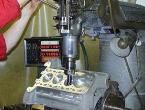Reading test spring. Literary reading test on the topic I love Russian nature. Spring (grade 2). To the section "Oral folk art"
Literary reading test in the section "I love Russian nature. Spring"
The literary reading test was compiled in accordance with the program "School of Russia" and checks the basic level of knowledge of 2nd grade students in the section "I love Russian nature. Spring". The test consists of 13 questions.
Form start
Question #1
What word is not associated with the theme of spring?
Snow
The sun
leaf fall
Icicle
Question #2
E. Blaginina
A. Pleshcheev
I. Bunin
E. Moshkovskaya
Question #3
Who wrote the poem "Mother"?
S. Marshak
I. Bunin
F. Tyutchev
E. Blaginina
Question #4
What mood is inspired by A. Pleshcheev's poem "Spring"?
sad
dreary
joyful
sad
Question #5
In the poem by F. Tyutchev “Winter is not without reason angry ...” it is said about the struggle:
Winters with spring
Spring with summer
Winters with autumn
Spring with autumn
Question #6
Finish the quatrain of A. Blok.
... Chu, a sonorous voice is heard.
Isn't this spring?
No, this is a call, subtly
In the stream...
the moon shines
murmuring water
murmuring wave
glitter star
Question #7
E. Blaginina
A. Pleshcheev
I. Bunin
E. Moshkovskaya
Question #8
Who wrote the poem "Into the Storm"?
S. Marshak
A. Pleshcheev
F. Tyutchev
E. Blaginina
Question #9
What is said in A. Pleshcheev's poem "Rural Song"?
About the arrival of birds
About the flight of birds
About the flood of rivers
About melting snow
Question #10
Fill in the missing words in the quatrain.
"Everything is getting darker every day
Stitches and paths.
And on willows...
Earrings glow."
silver
lights
gold
brightly
Question #11
What are the names of words that help to figuratively see an object or action?
personification
comparison
epithets
Question #12
Determine the theme of the poem "Spring Waters".
The struggle of winter with spring
Ice drift
The return of birds to their homeland
Mom's lullaby
Question #13
What color does the word "azure" mean?
pink
White
light blue
green
End of form
Testing
in literary reading
Grade 2
Topic: “I love Russian nature. Spring".
Option 1
1. Indicate the author of the poem "Spring Waters".
A - F. Tyutchev B - A. Blok
B — A. Pleshcheev G — S. Marshak
Winter is getting angry
Her time has passed
Spring is knocking on the window
And drives from the yard.
A. F. Tyutchev V. A. Blok
B. A. Pleshcheev G. S. Marshak
3. Mark the poem in which the mother sang a lullaby to the child.
A- "Let's sit in silence"
B- "Mothers"
B- "Into the storm"
G- "I offended my mother ..."
4. Finish the proverb.
There is no sweeter friend than...
A- old friend
B - dear mother
B - earring
Mr. fragrant bread
A- March 8
B- arrival of birds
B - the holiday of the first furrow
Mr. harvest festival
6. Guess the riddle about spring.
In a blue shirt
Runs along the bottom of the ravine.
A- snowdrop B- stream
B-tit G-hare
7. What word is not related to the theme of spring?
A- snow B- leaf fall
B- sun D- icicle
A - personification
B- Comparison
B-epithets
9. Finish the quatrain of A. Blok. ... Chu, a sonorous voice is heard. Isn't this spring? No, this is a call, subtly In the stream ...
A- the moon shines
B-Rubbering water
B-The wave is murmuring
G-shiny star
10. What mood is inspired by A. Pleshcheev's poem "Spring"?
A- sad B- happy
B-dreary G-sad
Option 2.
1. Indicate the author of the poem "Rural Song".
A. F. Tyutchev V. A. Pleshcheev
B. A. Blok G. S. Marshak
2. Specify the author of these lines.
The snow is no longer the same, -
It darkened in the field.
Ice cracked on the lakes
It's like they split.
A. A. Pleshcheev V. A. Blok
B. S. Marshak G. F. Tyutchev
3. Finish the proverb.
Warm in the sun, mother...
A- fun B- good
B- light D- satisfying
4. Mark the poem in which the girl did not interfere with her mother's rest.
A- "Let's sit in silence"
B- "Mothers"
B- "Into the storm"
G- "I offended my mother ..."
5. Indicate which holiday is not celebrated in the spring.
A- Maslenitsa
B- International Women's Day
On Christmas
G- The arrival of birds
6. Guess the riddle about spring.
He was the first to get out of the earth on a thawed patch.
He is not afraid of frost, even though he is small.
A- mole
B- snowdrop
B- worm
Mr. beetle
7. What word is not related to the theme of spring?
A-kidney B-storm
B- sun D- icicle
8. What are the names of the words that help to figuratively see an object or action?
A - personification
B- Comparison
B- Epithets
Fill in the missing words in the quatrain. “Everything turns black every day Stitches and paths. And on the willows ... Earrings glow.
A - silver
B-lights
In-gold
G-bright
10. What is said in A. Pleshcheev's poem "Rural Song"?
A - About the arrival of birds
B - About the departure of birds
B - About the flood of rivers
G- melting snow
Answer card
1 option
Answer card
Option 2
Class _____ Full name _______________________________________________________________
Subject literary reading_ Option _______ Date _______________ 2016
№ 1 2 3 4 5 6 7 8 9 10 11 12 13 14 15 16 17 18 19 20 total mark
Answer Teacher ______________________________________________//___________________________
Assistant______________________________________//___________________________
Municipal educational institution "Lyambirskaya secondary school No. 2" of the Lyambirsky municipal district of the Republic of Mordovia
Option 1.
A1. Find the extra word.
1) snow 3) leaf fall
I offended my mother
Now never - never
Let's not leave the house together
We don't go anywhere with her.
1) E. Blaginina 3) I. Bunin
2) A.Plescheev 4) E.Moshkovskaya
A3. Who wrote the poem "Mother"?
1) S. Marshak 3) F. Tyutchev
2) I. Bunin 4) E. Blaginina
IN 1. In the poem by F. Tyutchev “Winter is not without reason angry ...” it is said about the struggle:
1) winters with spring 3) winters with autumn
2) spring with summer 4) spring with autumn
C1. Finish the quatrain by A. Blok
Isn't this spring?
No, it's loud, thin
In the stream...
1) the moon is shining 3) the wave is murmuring
2) water gurgles 4) star shines
Test 9. I love Russian nature Spring.
Option 2.
A1. Find the extra word.
1) blizzard 3) drops
I would sing a song
I could laugh...
1) A. Pleshcheev 3) I. Bunin
2) E. Moshkovskaya 4) E. Blaginina
A3. Who wrote the poem "Into the Storm"?
1) S. Marshak 3) A. Pleshcheev
2) F. Tyutchev 4) E. Blaginina
IN 1. What is said in A. Pleshcheev's poem "Rural Song"?
1) about the arrival of birds 3) about the overflow of rivers
2) about the departure of birds 4) about the melting of snow
C1. Fill in the missing word in the quatrain.
It's getting blacker every day
Stitches and paths.
And on willows…..
Earrings glow.
1) silver 3) gold
2) lights 4) bright
Option 1.
A1. Who believes that "the most beautiful thing is the Moth"?
1) Flower 3) Peacock
2) Owl 4) Birds
A2. Who sang this song?
The bear loves honey!
Why? Who will understand?
Indeed, why
Does he like honey?
1) Piglet 3) Winnie the Pooh
2) Eeyore 4) Cheburashka
A3. This funny animal came from a dense tropical forest. Who is he?
1) Cheburashka 3) Winnie the Pooh
2) crocodile Gena 4) baby elephant
1) E. Uspensky 3) V. Berestov
2) B. Zakhoder 4) G. Oster
IN 1. What did Winnie the Pooh call his songs?
1) songs 3) puffers
2) riddles 4) clumsy
C1. Remember what always becomes apparent.
1) secret 3) mysterious
2) false 4) secret
Test 10. Both jokingly and seriously.
Option 2.
A1. Who says that “the most beautiful thing is darkness”?
1) Trees and Grasses 3) Owls and Moles
2) Wolf and Fox 4) Animals and Birds
A2. Whose song is this?
If bears were bees
Then they wouldn't care
Never would have thought
So high to build a house.
1) Eeyore 3) Cheburashki
2) Piglet 4) Winnie the Pooh
A3. Who wrote the fairy tale "Crocodile Gena and his friends"?
1) E. Uspensky 3) V. Dragunsky
1) B. Zakhoder 3) V. Berestov
2) E.Uspensky 4) I.Tokmakova
IN 1. What did Winnie the Pooh call his songs?
1) puffers 3) noisemakers
2) nozzles 4) compositions
C1. Finish the statement.
The hero of the poem by V. Berestov loved to walk with a friend ....
1) boy 3) kitten
2) puppy 4) child
Option 1.
A1. Give the name of an English folk song.
1) "Gloves"
2) "Bulldog named Dog"
3) "Suzon and the Moth"
4) “Moms know, children know”
A2. What can't you move the cart without?
1) without horse 3) without wheels
2) without difficulty 4) without adults
A3. From what language did N. Gernet and S. Gippius translate the song "Suzon and the Moth"?
1) from German 3) from English
2) from American 4) from French
IN 1. Which song tells about a girl who didn't want to study?
1) “Braves” 3) “Moms know, children know”
2) "Suzon and the Moth" 4) "Gloves"
C1. Find the exact definition of the word "folklore".
1) art created by the people
2) songs
3) fairy tales and songs
4) everything that a person came up with
Test 11. Literature of foreign countries. Children's songs.
Option 2.
A1. Which of the following is an English folk song?
1) "Bulldog named Dog"
2) "Suzon and the Moth"
3) "Braves"
4) “Moms know, children know”
A2. What did the bulldog like to play while walking?
1) hide and seek 3) tag
2) in leapfrog 4) in bast shoes
A3. From what language did V. Viktorov translate the song “Mothers know, children know”?
1) from French 3) from English
2) from American 4) from German
IN 1. Which song tells about an object that was lost and then found?
1) "Brave" 3) "Gloves"
2) “Moms know, children know” 4) “Bulldog named Dog”
C1. Which is not folklore.
1) folk songs, riddles, nursery rhymes
2) folk tales
Option 1.
A1. Who wrote the fairy tale "Muffin and the Spider"?
1) Ch.Perrot 3) E.Hogarth
2) G.H. Andersen 4) Brothers Grimm
A2. Indicate the name of the fairy tale by G.H. Andersen.
1) Little Red Riding Hood 3) Puss in Boots
2) "The Princess and the Pea" 4) "Muffin and the Spider"
A3. Who is Oswald?
1) ostrich 3) spider
2) donkey 4) penguin
IN 1. Who appeared in place of the terrible spider?
1) little princess
2) tiny princess
3) tiny fairy
4) lovely sorceress
The outfit turned out to fit and to the face, and since the marquis was already small even where - handsome and stately, then, having dressed up, he, of course, became even better ...
1) "Puss in Boots" 3) "Muffin and the Spider"
2) "Princess and the Pea" 4) "Little Red Riding Hood"
Test 12. Literature of foreign countries. Fairy tales.
Option 2.
A1. Who wrote the fairy tale "The Princess and the Pea"?
1) Ch.Perrot 3) G.Kh.Andersen
2) E. Hogarth 4) Brothers Grimm
A2. Indicate the name of the fairy tale by E. Hogarth.
1) "Puss in Boots" 3) "The Princess and the Pea"
2) Little Red Riding Hood 4) Muffin and the Spider
A3. Who is Mafin?
1) giraffe 3) puppy
2) penguin 4) donkey
IN 1. What happened to the lovely little fairy?
1) she turned into a beautiful flower
2) she flew to the Fairy Fairyland
3) she flew away to the neighboring garden
4) she turned into a lovely butterfly
C1. What story are these lines from?
In the pit, from where people took sand to sprinkle the paths, two inseparable friends were busy: Oswald the ostrich and Willy the worm.
1) "Muffin and the Spider" 3) "Little Red Riding Hood"
2) "The Princess and the Pea" 4) "Puss in Boots"
Test work 1.
OVTSECROVT EONDORAN EONTSU
| household |
In a fairy tale the sky is blue
In the fairy tale, the birds are scary.
Rechenka, save me
Rechenka, save me!
Test work 1.
To the section "Oral folk art"
1. Read from right to left. Write down what happened.
OVTSECROVT EONDORAN EONTSU
2. Add the titles of the read fairy tales. Highlight the one you like the most.
“Fear has __________________________________________.”
“The Fox and ___________________________________________”.
“Porridge from __________________________________________”.
· «Cockerel and _______________________________________».
"Geese - ___________________________________________".
"The Fox and _________________________________".
3. What groups are fairy tales divided into? Add.
| household |
4. Learn a fairy tale. Write down its name.
In a fairy tale the sky is blue
In the fairy tale, the birds are scary.
Rechenka, save me
Rechenka, save me!
_________________________________________________
Test work 2.
1. What changes in nature occur with the onset of autumn?
_______________________________________________________
_______________________________________________________
_______________________________________________________
________________________________________________________
________________________________________________________
________________________________________________________
3. "Collect" proverbs by connecting their beginning and ending with an arrow. Write down one of them, explain its meaning.
1) In the spring, the rain soars, ... a) ... and the person becomes kinder.
2) Feed me in the spring, ... b) ... if the goose comes out on the ice.
3) In the autumn, the cattle gets fat, ... c) ... and in the fall it gets wet.
4) What kind of autumn, ... d) ... and in the fall I myself will be full.
______________________________________________________________________________________________________________________________________________________________________________________________________________________________________________________________________________________________________________________________________________
Test work 2.
To the section “I love Russian nature. Autumn"
2. What changes in nature occur with the onset of autumn?
________________________________________________________________________________________________________________________________________________________________________________________________________________________________________________________
2. In a few words, guess what kind of poem it is and who its author is. Write it down.
· Colder, sadder, fly away, shine, laugh, wake up.
_______________________________________________________
· Flowers, bushes, meadows, fields.
_______________________________________________________
Sleeping, dark, angry, window.
_______________________________________________________
· Short, wondrous, peppy, cobwebs, idle.
________________________________________________________
· Basket, birch, cunning, under spruce, frightened.
________________________________________________________
Silence, height, silence, rustling.
________________________________________________________
4. "Collect" proverbs by connecting their beginning and ending with an arrow. Write down one of them, explain its meaning.
5) In the spring, the rain soars, ... a) ... and the person becomes kinder.
6) Feed me in the spring, ... b) ... if the goose comes out on the ice.
7) In autumn, livestock gets fat, ... c) ... and wets in autumn.
8) What an autumn, ... d) ... and in the fall I myself will be full.
Test work 3.
Verification work on the topic “I love Russian nature. Spring."
F. I. student _________________________________________________
1) F. Tyutchev 3) A. Pleshcheev
2) A. Blok 4) S. Marshak
The snow is no longer the same, -
It darkened in the field.
Ice cracked on the lakes
It's like they split.
_______________________________________________________
3. Mark the poem in which the mother sang a lullaby to the child:
1) "Let's sit in silence"
2) "Mothers"
3) "Into the storm"
4) “I offended my mother ...”
4. Finish the proverb: There is no sweeter friend than...
1) old friend
2) dear mother
3) an earring from an ear
4) fragrant bread
5. Determine the topics of the poems. Match them with names.
The struggle of Winter with Spring "Country Song"
The return of birds to their homeland "Winter is not without reason angry ..."
Mom's lullaby "I offended my mother ..."
Mom's rest "Into the storm"
It's bad without mom "Let's sit in silence"
6. Guess riddles about spring.
1) In a blue shirt
Runs along the bottom of the ravine.
1) snowdrop 3) stream
2) tit 4) hare
2.) He was the first to get out of the earth on a thawed patch.
He is not afraid of frost, even though he is small.
2) snowdrop
7. Insert the missing word:
In the night - frost
Since morning - …………………..,
So it's April.
Literary reading tests in the section “I love Russian nature. Spring ”corresponds to the theme and program of the EMC School of Russia. This will allow the teacher to analyze the depth of knowledge and understanding of students of the studied material. The teacher will be able to adjust further work with students to eliminate gaps in knowledge.
Download:
Preview:
LITERARY READING TESTS
TOPIC: I LOVE RUSSIAN NATURE. SPRING
Class: 2
Subject: Literary reading
(EMC "School of Russia")
2014-2015 academic year G.
Option 1
1) F. Tyutchev 3) A. Blok
2) A. Pleshcheev 4) S. Marshak
Winter is getting angry
Her time has passed
Spring is knocking on the window
And drives from the yard.
1) F. Tyutchev 3) A. Blok
2) A. Pleshcheev 4) S. Marshak
3. Mark the poem in which the mother sang a lullaby to the child.
1) "Let's sit in silence"
2) "Mothers"
3) "Into the storm"
4) “I offended my mother ...”
4. Finish the proverb.
There is no sweeter friend than...
1) old friend
2) dear mother
3) an earring from an ear
4) fragrant bread
2) arrival of birds
3) holiday of the first furrow
4) harvest festival
6. Guess the riddle about spring.
In a blue shirt
Runs along the bottom of the ravine.
1) snowdrop 3) stream
2) tit 4) hare
Option 2
1) F. Tyutchev 3) A. Pleshcheev
2) A. Blok 4) S. Marshak
The snow is no longer the same, -
It darkened in the field.
Ice cracked on the lakes
It's like they split.
1) A. Pleshcheev 3) A. Blok
2) S. Marshak 4) F. Tyutchev
3. Finish the proverb.
Warm in the sun, mother...
1) fun 3) good
2) light 4) satisfying
4. Mark the poem in which the girl did not interfere with her mother's rest.
1) "Let's sit in silence"
2) "Mothers"
3) "Into the storm"
4) “I offended my mother ...”
5. Indicate which holiday is not celebrated in the spring.
1) Maslenitsa
2) International Women's Day
3) Christmas
4) arrival of birds
6. Guess the riddle about spring.
He was the first to get out of the earth on a thawed patch.
He is not afraid of frost, even though he is small.
1) mole
2) snowdrop
3) worm
4) beetle
Literature:
- Klimanova L.F., Boyko M.V. Literary reading. Work programs. 1-4 grades.
- Klimanova L.F. Literary reading lessons. Lesson developments. Grade 2
- Literary reading. Textbook. Grade 2 At 2 o'clock / comp. L.F. Klimanov, V.G. Goretsky, L.A. Vinogradskaya
- Literary reading. Workbook. M.V. Boykina, L.A. Vinogradskaya. Grade 2




